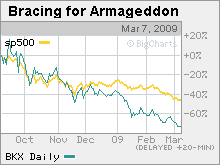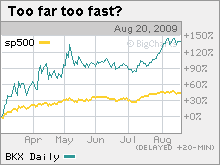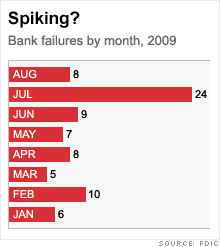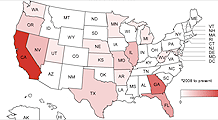Bouncing banks may be bad bets
Sure, big banks like Citigroup and Bank of America may have bottomed, but some think the sector still isn't out of the woods yet -- including bankers.

 |
| Bank stocks may have fallen too far in the immediate aftermath of Lehman's collapse. The KBW Bank Index really took it on the chin compared to the S&P 500. |
 |
| But some worry that the recovery in bank stocks, which has far outpaced the broader market, may be a sign that investors are ignoring the possibility of more bad loan problems ahead. |

NEW YORK (CNNMoney.com) -- Banks are still failing left and right, and according to a recent survey of top financial services leaders, a big majority of bank executives think that a recovery in their industry will lag an overall economic rebound.
So why are shares of big banks surging? Citigroup, aka the bank that you and I now own more than a third of, has more than quadrupled from its March lows.
Granted, that took Citi (C, Fortune 500) from under a buck to about $4 and change. (Give me a C! A bouncy C! First reader to e-mail me with the source of that reference gets a shout-out in tomorrow's Buzz.)
But Citi is now trading near its 2009 high point and has shot up about 30% in August alone. And other taxpayer-subsidized financial firms are also on fire.
The stock of Bank of America (BAC, Fortune 500) has soared nearly 450% since March and is now actually up more than 20% this year -- despite still being on the hook for $45 billion in funds from the Troubled Asset Relief Program.
Money-losing TARP recipients KeyCorp (KEY, Fortune 500), SunTrust (STI, Fortune 500) and Regions Financial (RF, Fortune 500) have also posted nice gains since March.
And then there's embattled insurer AIG (AIG, Fortune 500). It has more than doubled since the poster child for bailouts conducted a reverse stock split last month in order to lift its lagging share price. (Yeah, AIG is not a bank. But it might as well have been considering that its exposure to credit default swaps tied to subprime mortgages is what doomed it.)
Here's the issue. For sure, financials are by no means healthy. The challenge for investors: Have bank stocks really run too far too fast? Or are they are just normalizing after a six-month stretch that left many banks at prices that were factoring in a biblical plague of locusts?
Even though the KBW Bank Index, a key barometer for the sector, is up nearly 150% from its early-March lows, the index remains 35% below where it was on the last trading day before Lehman Brothers went under.
From Sept. 15, 2008, through March 6, 2009, the index plunged a stomach-churning 74%.
A lot has changed since March. And even though banks still face a litany of worries, such as record-high mortgage delinquencies and growing problems in the commercial real estate loan market, some sense that the worst is over.
Just look at how orderly the failed bank process has been, for example. Even though some notable regional banks have either failed or on the verge of collapse, the FDIC seems to have had no major problem finding willing (and stronger) buyers in a relatively orderly fashion.
BB&T (BBT, Fortune 500) acquired the failed Alabama lender Colonial BancGroup last week. And according to several reports, the FDIC is set to soon seize foundering Guaranty Financial of Texas and sell it to Spanish bank BBVA.
It also goes without saying that the failures of Colonial and Guaranty, while large, don't approach the scale of last fall's events: the bankruptcy of Lehman, near collapse of AIG, failure of S&L Washington Mutual and fire sale of Wachovia.
"The health of banks is a concern, but it's not as big as it was at this time a year ago," said Alan Levenson, chief economist with T. Rowe Price. "The key is that the failed banks are being taken over and sold quickly. There is not as systemic a threat as there was with Lehman brothers and AIG."
Some prominent investors appear to be willing to make a bet on a bottom as well.
Influential hedge fund manager John Paulson, who profited in 2007 and 2008 due to bearish (and prescient) bets about the mortgage market, disclosed last week this his firm acquired new stakes in several banks, including BofA, Regions and SunTrust in the second quarter.
But not everyone agrees that banks are out of the woods though.
Daniel Alpert, managing director of Westwood Capital, a New York-based investment bank, said that he expects more big writedowns to come in the next few quarters due to residential and commercial mortgages that will go bad.
"There are a few banks that can probably make it through even with more writedowns. But the notion that all these banks will survive doesn't work, especially the regional banks," he said, pointing to the fact that banks overall hold nearly $5 trillion in real estate debt on their books.
Mark Travis, president of Intrepid Capital Funds, a Jacksonville Beach, Fla.-based money management firm, said that he's considered buying bank stocks but thought against it because it's still not certain how to value their toxic assets.
"You're starting to see an inkling of change for the better and we've kicked the tires on banks," Travis said. "But we're not putting any money to work. There are still worries about what the loans are worth."
Travis added that investors may also now be speculating on many bank stocks in light of the news of Paulson's big investments. That's another reason to be cautious.
Finally, bankers themselves seem to not really know what's next for their industry. According to a survey released by KPMG earlier this week, only a little more than a third of senior bank executives said they thought banks would bounce back before the overall economy did.
"The downturn impacted the banking and financial services industry to a greater degree than most industries and therefore it will take longer to fully recover," said Tony Anzevino, partner-in-charge of KPMG LLP's Banking and Finance practice in a statement.
The good news, if you could call it such, is that the government is unlikely to let any major bank that runs into significant trouble going forward fail. So we are unlikely to have a repeat of last year's Lehman-induced crisis of confidence.
That said, Alpert points out that investors are ignoring the risk that the government may have to step in and take bigger stakes in banks, which is what it did when it converted preferred shares it owned in Citi into common stock.
Such actions may have helped stabilize Citi in the short-term but it comes at the price of massively diluting the value of the bank for existing shareholders.
Given that, it's tough to understand why bank stocks are outpacing the broader market's rebound. If anything, investors should view most banks as being a case of first ones in to the recession and last ones out.
Talkback: Are bank stocks ahead of themselves or is now a good time to bet on an eventual bank recovery? Add your comments below. ![]()


